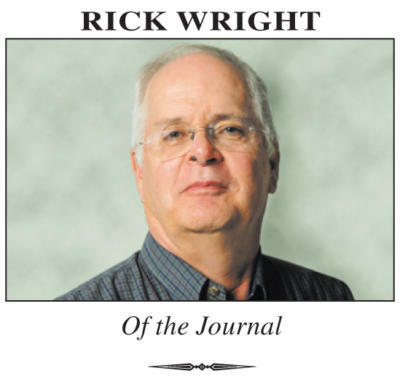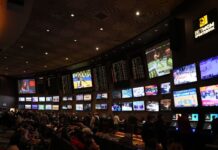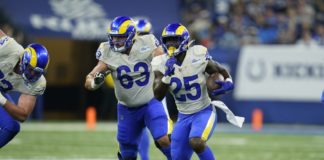It was the summer of 1976, and Albuquerque Dukes center fielder Glenn Burke had “can’t miss” written all over him.
That season, Burke would hit an even .300, set a Pacific Coast League record with 63 stolen bases and cover vast amounts of territory in the outfield. Though not a power hitter, despite his splendid physique – he hit just seven home runs that year – Burke used his blinding speed to hit 10 triples and once hit four doubles in a single game.
Yet, three years later he was out of organized baseball, having hit just .237 in 556 Major League at-bats with the Los Angeles Dodgers and Oakland Athletics.
Was Burke simply not a major league hitter, unable to get around on a J.R. Richard fastball or to put a bat on a Jim Palmer slider? Maybe.
Was he simply too emotional, his outgoing personality and joy for the game – he’s credited with having invented the high five while with the Dodgers in 1977 – sometimes overtaken by frustration, sullenness and outbursts of temper? Perhaps.
Yet, there was something else. Glenn Burke was a gay man in a sport and time that had no place, no tolerance, for a gay man.
Burke publicly announced he was gay in 1982, three years after he played his last game. He died of complications from AIDS in 1995 at age 42.
There is no way of knowing, says Andrew Maraniss, author of a Burke biography entitled “Singled Out,” precisely the impact on his major league career of his sexuality and his fear of discovery amid professional sports’ disdain.
But, Maraniss said in a recent phone interview with the Journal, “Baseball being a mental game, it’s easy to see how everything that was in his head, looking over his shoulder, wondering if his secret would get out (could have affected his performance).”
Burke’s story proved a near-perfect companion to Maraniss’ two previous books, both of which addressed accounts of discrimination in sports from earlier decades, and both of which – like “Singled Out” – remain all too relevant today.
Maraniss’ first book, “Strong Inside,” tells the story of Vanderbilt basketball player Perry Wallace, who broke the color barrier in the Southeastern Conference in 1967. He followed with “Games of Deception,” the account of the 1936 U.S. Olympic basketball team’s tortuous path to a gold medal in Adolf Hitler’s Germany.
In all three books, Maraniss said, sports served as a backdrop to greater discussions about prejudice and discrimination.
“They’re really about different sorts of brands of injustice in the world,” he said, “people being treated unfairly, and posing the question to the reader: How would I deal with a situation like that today?”
Today, it seems a statistical impossibility that there’s not a single gay player in the NFL, the NBA, the NHL or Major League Baseball. Yet only one man, NBA player Jason Collins, came out while still active.
Billy Bean, who played for the Tigers, Dodgers and Padres during an eight-year MLB career, came out as gay four years after he played his last game. In an interview with Maraniss for “Singled Out,” Bean said he completely understood why a gay athlete would choose to remain closeted today.
“As a professional athlete, they only have a short window to make the most of (a career) both as an athlete and financially,” Maraniss said. “So they’re thinking, ‘Well, my career is not really going to be that long anyway. Why would I add another risk factor?’”
That’s precisely the dilemma that Burke faced throughout his career.
Growing up in Berkeley, California, Burke blossomed into a spectacular athlete – recruited for basketball by multiple colleges (including New Mexico) and drooled over by baseball scouts.
Burke’s Albuquerque connection, it turns out, goes back that far. Mike Hall, later to become a sports writer and editor for the Albuquerque Tribune and the Journal, worked for the Berkeley Gazette in the 1970s. He met and interviewed Burke, then having just graduated from high school.
“Glenn Burke in the 1970s was worshipped in the city of Berkeley,” Hall wrote for the Journal in 1994, “not only by kids who looked up to him but also by his peers and even his coaches.”
And Hall (who died in 2007) found the teenage phenom to be unspoiled by success. “He was courteous, a gentleman,” Hall wrote. “Not an ounce of arrogance.”
Burke chose baseball, signing with the Dodgers – but played basketball at the University of Nevada for two years before the Dodgers, fearing injury, withdrew their permission.
By the time Burke got to Albuquerque in 1976, having had the proverbial cup of coffee with the Dodgers, his natural ebullience had turned mercurial. During the 1976-77 seasons, Journal sports writer Bart Ripp described him as “moody” so often one might have thought “Glenn” was his middle name, as in “Moody Glenn Burke.”
Burke, Maraniss wrote (as did Ripp) believed he belonged with the Dodgers and not the Dukes. Clearly, though, other things affected his demeanor.
And once up with the Dodgers, amid the scrutiny that major leaguers inevitably receive, his secret leaked out.
Dodgers general manager Al Campanis urged Burke to get married, a la Rock Hudson, to quiet the whispers. Manager Tommy Lasorda decided he didn’t need a light-hitting outfielder who was gay, and the Dodgers traded Burke to Oakland in 1978.
But A’s manager Billy Martin’s take on the situation was the same as Lasorda’s, and Burke didn’t prosper in Oakland.
“How,” Maraniss asked, “could you fulfill your potential with all that going on?”
On June 4, 1979, Burke walked away from the game.
Fifteen years later on his death bed, Maraniss said, “Glenn said he hoped that his experience would make it easier for other gay ballplayers in the future (to come out).”
Has it?








